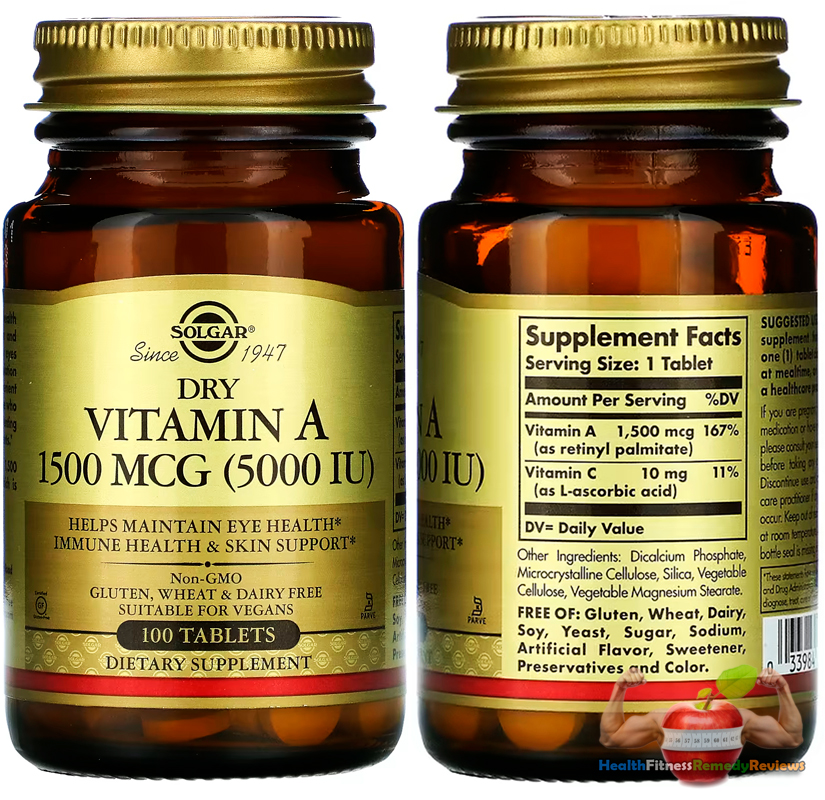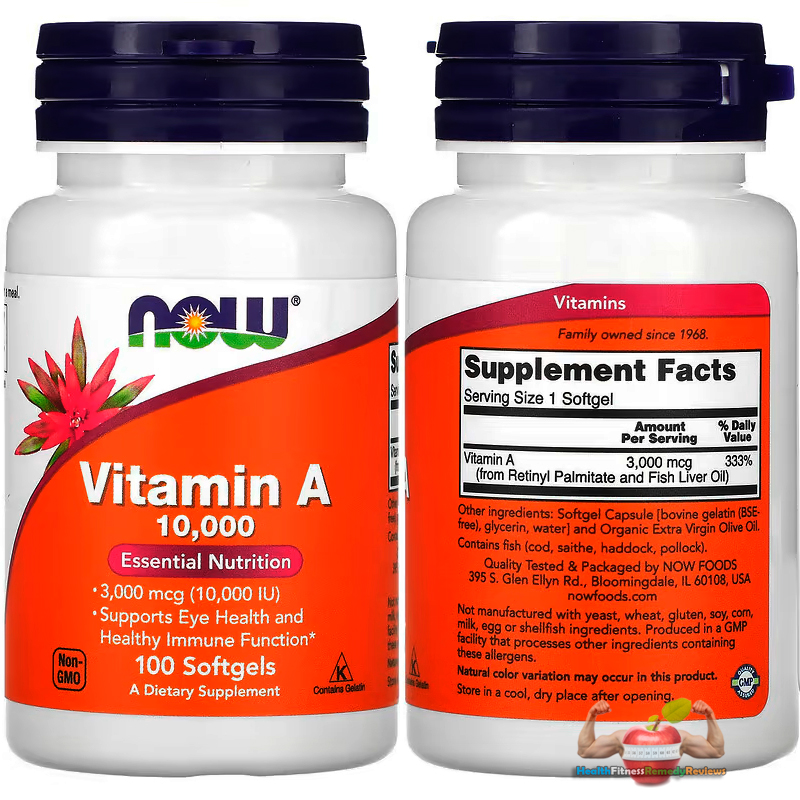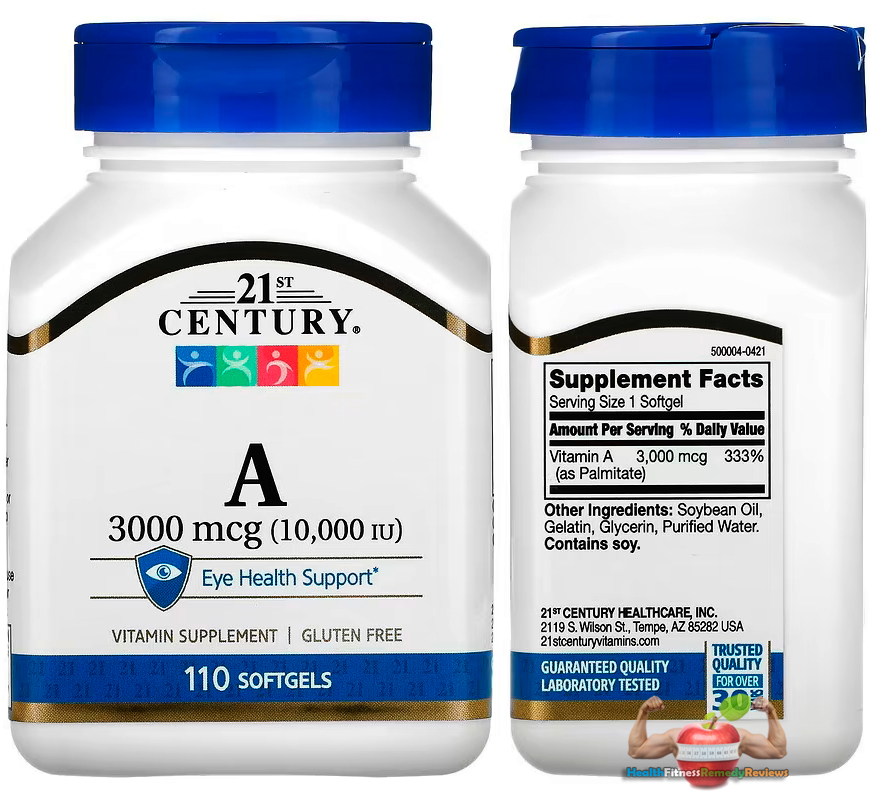Unlocking the Benefits of Vitamin A for a Healthy Body and Mind. Best Vitamin A Dietary Supplements

Vitamin A is a fat-soluble vitamin that is essential for many important functions in the human body. It is found naturally in a variety of foods, and is also available in the form of supplements. In this article, we will discuss the benefits of vitamin A for the human body and the sources of this essential nutrient.
Contents
What is Vitamin A?
Vitamin A is a group of compounds that includes retinol, retinal, and retinoic acid. These compounds are important for a variety of functions in the body, including vision, immune function, reproduction, and cellular communication. Vitamin A is also important for maintaining healthy skin and mucous membranes.
Sources of Vitamin A
Vitamin A is found in a variety of foods, including:
- Animal sources: liver, fish, eggs, and dairy products.
- Plant sources: carrots, sweet potatoes, spinach, kale, and broccoli.
In addition, some foods are fortified with vitamin A, including cereal, milk, and other dairy products.
Benefits of Vitamin A
- Promotes Good Vision: Vitamin A is essential for maintaining good eyesight. It plays a crucial role in the production of rhodopsin, a protein that helps the retina of the eye to absorb light. A deficiency in vitamin A can lead to night blindness and even blindness.
- Supports Immune Function: Vitamin A is also important for the proper functioning of the immune system. It helps to maintain the integrity of the skin and mucous membranes, which act as a barrier against infection. Vitamin A also helps to stimulate the production of white blood cells, which are important for fighting off infections.
- Maintains Healthy Skin: Vitamin A is essential for maintaining healthy skin. It helps to regulate the production of sebum, a natural oil produced by the skin that helps to keep it hydrated. Vitamin A also promotes the growth and development of new skin cells, which helps to keep the skin looking healthy and youthful.
- Supports Reproduction: Vitamin A is important for the proper functioning of the reproductive system. It plays a role in the production of sperm and is essential for the development of the fetus during pregnancy.
- Helps to Prevent Cancer: Some studies have suggested that vitamin A may help to prevent certain types of cancer, such as lung cancer and prostate cancer. However, more research is needed to confirm these findings.
Recommend to read: Alpilean Australia Reviews. It’s Awesome! DISCOUNT⚠️ How To Take?
Daily Recommended Intake of Vitamin A
The daily recommended intake of vitamin A varies depending on age and gender. For adult men, the recommended intake is 900 mcg per day, while for adult women, it is 700 mcg per day. Pregnant and breastfeeding women require higher amounts of vitamin A, with the recommended intake ranging from 770 to 1300 mcg per day.
It is important to note that consuming excessive amounts of vitamin A can be harmful, and can lead to symptoms such as nausea, vomiting, and headache. Therefore, it is important to consume vitamin A in moderation, and to consult with a healthcare professional before taking vitamin A supplements.
Sure, I’d be happy to provide more detailed information about Vitamin A and its benefits for the human body.
Sources of Vitamin A
Vitamin A is present in two different forms, preformed Vitamin A and provitamin A. Preformed Vitamin A is found in animal products such as liver, fish, eggs, and dairy products. Provitamin A is found in plant-based foods such as carrots, sweet potatoes, spinach, broccoli, and fruits such as mangoes and papayas. The body converts provitamin A into retinol, the active form of Vitamin A.
Functions of Vitamin A
- Vision: Vitamin A is critical for maintaining healthy vision. Retinol, the active form of Vitamin A, is a key component of rhodopsin, a protein in the retina of the eye that helps us see in low light conditions. Vitamin A deficiency can lead to night blindness and other vision problems.
- Immune System: Vitamin A is essential for a healthy immune system. It helps to produce white blood cells, which are essential for fighting off infections and diseases. Vitamin A also helps to maintain the integrity of the mucous membranes, which act as a barrier against bacteria and viruses.
- Skin Health: Vitamin A is essential for maintaining healthy skin. It helps to regulate the growth and development of skin cells, preventing dryness, and reducing the risk of skin infections. Vitamin A also promotes the production of collagen, a protein that gives the skin its elasticity and prevents wrinkles.
- Growth and Development: Vitamin A is critical for the growth and development of the body. It helps to regulate gene expression and cell differentiation, allowing the body to develop and grow correctly. It is also essential for the development of bones and teeth.
- Anti-Inflammatory: Vitamin A has anti-inflammatory properties, which help to reduce inflammation in the body. It can help to alleviate symptoms of inflammatory conditions such as rheumatoid arthritis, psoriasis, and asthma.
- Reproductive Health: Vitamin A is essential for reproductive health. It helps to regulate the production of sex hormones and supports the growth and development of the fetus during pregnancy.
Recommend to read: Alpilean Weight Loss Reviews. Is It Safe? Does It Work?
Vitamin A Deficiency
Vitamin A deficiency is a significant health concern, especially in developing countries. It can lead to a range of health problems, including:
- Night Blindness: A condition where the eyes cannot adapt to low light conditions.
- Xerophthalmia: A condition where the eyes become dry and irritated.
- Skin Problems: Vitamin A deficiency can lead to dry, flaky skin, and an increased risk of skin infections.
- Weak Immune System: Vitamin A deficiency can weaken the immune system, making the body more susceptible to infections and diseases.
- Growth and Development Problems: Vitamin A deficiency can lead to stunted growth and development, especially in children.
Recommended Daily Intake
The recommended daily intake of Vitamin A for adults is 700-900 mcg for men and 600-700 mcg for women. Pregnant women require higher amounts of Vitamin A to support fetal development.
Best Dietary Supplements of Vitamin A
Vitamin A is an essential nutrient that plays a vital role in maintaining healthy vision, immune function, and skin health. While Vitamin A is abundant in many foods, some people may not get enough of this important nutrient from their diet alone. That’s where dietary supplements come in. Here are some of the best dietary supplements of Vitamin A:
- Solgar Vitamin A: Solgar Vitamin A supplements contain 5,000 IU of Vitamin A per softgel. They are made from natural fish liver oil and are free from gluten, wheat, and dairy.
- NOW Foods Vitamin A: NOW Foods Vitamin A supplements contain 10,000 IU of Vitamin A per softgel. They are made from fish liver oil and are free from common allergens such as soy, gluten, and dairy.
- Nature’s Way Vitamin A Softgels: are a dietary supplement that provides 3,000 mcg (10,000 IU) of Vitamin A per serving. The softgels are made from fish liver oil and contain no artificial colors, flavors, or preservatives. Vitamin A is an essential nutrient that supports healthy vision, immune function, and skin health. These softgels are an easy and convenient way to supplement your diet with Vitamin A.
- 21st Century Vitamin A Softgels: are a dietary supplement that provides 3,000 mcg (10,000 IU) of Vitamin A per serving. The softgels are made from fish liver oil and contain no artificial colors, flavors, or preservatives. Vitamin A is an essential nutrient that supports healthy vision, immune function, and skin health.
When choosing a Vitamin A supplement, it’s important to pay attention to the dosage and form of Vitamin A. While Vitamin A supplements can be beneficial, taking too much Vitamin A can be harmful. The recommended daily intake of Vitamin A for adults is 900 micrograms (mcg) for men and 700 mcg for women. It’s also important to choose a form of Vitamin A that is easily absorbed by the body, such as retinyl palmitate or retinyl acetate.
Recommend to read: ProDentim Reviews: Is It a Scam? Real Reviews and Complaints
Don’t forget in addition to taking a Vitamin A supplement, it’s important to eat a balanced diet that includes foods rich in Vitamin A, such as sweet potatoes, carrots, spinach, and liver. By combining a healthy diet with a high-quality Vitamin A supplement, you can ensure that your body is getting the nutrients it needs to function at its best.
Final Words
Vitamin A is an essential nutrient that plays a crucial role in many important functions in the human body. It is found in a variety of foods, including animal sources such as liver, fish, and eggs, and plant sources such as carrots, sweet potatoes, and spinach. Vitamin A is important for maintaining good vision, supporting immune function, maintaining healthy skin, and supporting reproduction. It is important to consume vitamin A in moderation, and to consult with a healthcare professional before taking vitamin A supplements.
Tell us about your favorite Vitamin A dietary supplements and your own experience in the comments below. And don’t forget to join our friendly community.
Science References
- “Vitamin A Fact Sheet for Health Professionals” from the National Institutes of Health Office of Dietary Supplements (https://ods.od.nih.gov/factsheets/VitaminA-HealthProfessional/)
- “Vitamin A” from the World Health Organization (https://www.who.int/elena/titles/vitamina_children/en/)
- “Vitamin A and Immune Function” from the Journal of Clinical Medicine (https://www.ncbi.nlm.nih.gov/pmc/articles/PMC6836118/)
- “Vitamin A and Skin Health” from the Journal of Clinical and Aesthetic Dermatology (https://www.ncbi.nlm.nih.gov/pmc/articles/PMC5579659/)
- “The Role of Vitamin A in the Immune System” from Nutrients (https://www.ncbi.nlm.nih.gov/pmc/articles/PMC6162863/)
- “Vitamin A and Reproductive Health” from the Journal of Nutrition and Metabolism (https://www.ncbi.nlm.nih.gov/pmc/articles/PMC6162863/)


























